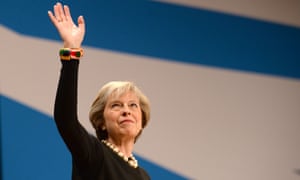Theresa May has given her strongest indication yet that the UK’s exit from the EU will lean towards a “hard Brexit”, suggesting that regaining control of immigration was more important than access to the single market.
Addressing the Conservative party conference in Birmingham, the prime minister also promised that all EU workers’ rights would remain protected for as long as she was in power.
Controlling immigration would be the key basis for departure, May said. The government would seek access to the EU’s single market if possible, she said, adding: “But let me be clear. We are not leaving the European Union only to give up control of immigration again. And we are not leaving only to return to the jurisdiction of the European court of justice.”
Reiterating her announcement that article 50 – the legal device to begin the process of departure – would be triggered by the end of March, May stressed the task of overseeing the negotiations would be entirely up to the government, which would “get on the job” without being delayed or derailed by parliament or devolved administrations.
On the final terms for Britain’s EU exit, May argued that debate over a soft or hard Brexit was “simply a false dichotomy”, mainly put forward by those who had not accepted the result of the referendum.
People were “letting their thinking about our future relationship with the EU be defined by the way the relationship has worked in the past”, May argued.
The negotiations were going to be based on “the freedom to make our own decisions on a whole host of different matters, from how we label our food to the way in which we choose to control immigration”, May said.
She continued: “It is not, therefore, a negotiation to establish a relationship anything like the one we have had for the last 40 years or more. So it is not going to be a Norway model. It’s not going to be a Switzerland model. It is going to be an agreement between an independent, sovereign United Kingdom and the European Union.
Controlling immigration would be the primary concern, May said: “We have voted to leave the European Union and become a fully independent, sovereign country. We will do what independent, sovereign countries do. We will decide for ourselves how we control immigration. And we will be free to pass our own laws.”
Earlier in the speech, the prime minister dismissed the idea of some hardline Conservative Brexiters that the government could walk away from post-article 50 negotiations if they did not go well.
“Everything we do as we leave the EU will be consistent with the law and our treaty obligations, and we must give as much certainty as possible to employers and investors,” she said. “That means there can be no sudden and unilateral withdrawal: we must leave in the way agreed in law by Britain and other member states.”
May told the conference that when the European Communities Act is repealed, the EU law would be converted into British statute, which could be changed or repealed as parliament chose.
She added: “Let me be absolutely clear: existing workers’ legal rights will continue to be guaranteed in law – and they will be guaranteed as long as I am prime minister.”
Earlier on Sunday, May promised to trigger article 50 before the end of March 2017, having also announced plans for a “great repeal bill” to incorporate all EU regulations in UK law as soon as Brexit takes effect.
May told the BBC’s Andrew Marr Show on Sunday that she wanted to give “greater degree of clarity about the sort of timetable we are following” over the process for leaving the EU.
Speaking after May at the conference, the secretary of state for Brexit, David Davis, gave no extra details on how the process might take place, while also stressing that “the clear message from the referendum is this: we must be able to control immigration”.
He said this would be balanced as best as possible with trade: “We’re looking at all the options. And we’ll be prepared for any outcome. But it certainly won’t be to anyone’s benefit to see an increase in barriers to trade, in either direction.
“So we want to maintain the freest possible trade between us, without betraying the instruction we have received from the British people to take back control of our own affairs.”
